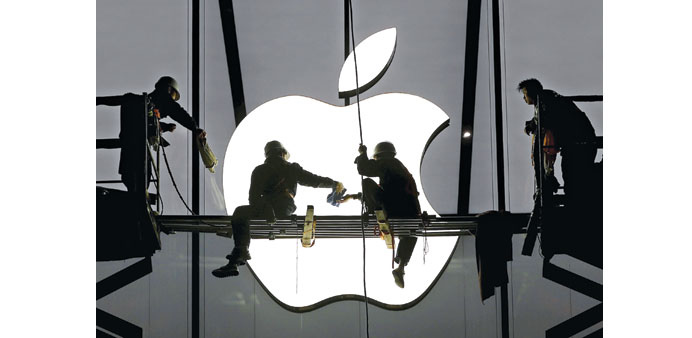Workers prepare for the opening of an Apple store in Hangzhou, Zhejiang province. A Chicago Board Options Exchange volatility gauge for Apple shares has jumped 39% since a low in March.
Bloomberg
New York
Apple Inc’s new habit of disclosing billions of dollars of stock buybacks along with its April earnings report is contributing to a flurry of options speculation.
Prices for contracts tied to Apple’s shares are the highest in a year and a half relative to the Nasdaq 100 Index before the company releases results. While the approach of earnings is enough to get speculation brewing in the stock, anticipation is also building after the iPhone maker boosted repurchases in 2013 and 2014.
“What investors are paying attention to are the capital allocation plans,” said Jeffrey Fidacaro, an analyst at Monness Crespi Hardt & Co, who rates Apple’s stock a buy with a price estimate of $145. “There’s a good probability that they increase.” Technology shares in the Standard & Poor’s 500 Index have rallied 4.1% in 2015 and sent the Nasdaq Composite Index to a record for the first time in 15 years as companies from Amazon.com Inc to EBay Inc beat profit projections. Apple has jumped 18%, taking its market capitalisation above $750bn.
The Apple VIX closed at 2.4 times the level of the Nasdaq 100 VIX last week, the highest ratio between the two since October 2013.
The options market is signalling that Apple will move 5.2% after the earnings report, higher than the average gain or drop following the past eight releases.
Josh Rosenstock, a spokesman for Apple, didn’t respond to an e-mail seeking comment on the options trading.
While shares of the iPhone maker have risen after the past four earnings releases, even a small disappointment could trigger selling, according to Manish Singh at Crossbridge Capital. Profit surged to $18bn in the holiday quarter. This time, the company that makes more than half its sales outside the Americas faces a surging dollar and is changing its retail strategy. The Apple Watch, rolled out globally on Friday, will be available only for online purchases and at authorised resellers initially.
“They have just set the bar so high,” said Singh, who oversees about $2bn as Crossbridge’s head of investments in London. He’s still holding his Apple shares. “It won’t be a stellar beat again.”
Since Apple first announced its plan for a total of $100bn in dividends and buybacks in April 2013, the month of April has proven paramount.
Apple laid out the largest buyback programme in corporate history on April 23, 2013, the same day it announced fiscal second-quarter earnings. The company added $55bn to its buyback plan, bringing the total to $100bn through 2015.
On April 23, 2014 – again, the same day as second-quarter results – the company said it would increase its share repurchase authorisation by $30bn, boost its dividend and split its stock 7-for-1. It looks like Apple might do it again. It’s due to report its quarterly results after the market close and announcements are in order, according to chief executive officer Tim Cook. “By and large, my view is for cash that we don’t need – with some level of buffer – we want to give back,” Cook said on February 10. “It may come across that we are, but we’re not hoarders.” The Cupertino, California-based company is reviewing its capital-return program and will announce changes in April, he said.
“We started with dividends and buybacks and we’ve tweaked that model every year,” Cook said. “We’ve been sort of on a cadence of once a year we look at it very deeply, very thoughtfully, and we change the programme accordingly.” Billionaire investor Carl Icahn, who has pushed Apple to return more money to shareholders, called the comments “great news” and raised his anticipated price for the company’s shares in a public letter on February 11.
Analysts have pushed up earnings estimates even as the stock rallied, making Apple shares cheaper than many peers. It trades at 14.9 times projected profits, 34% lower than the multiple for the Nasdaq Composite.
“The stock is very inexpensive,” said Kevin Kelly, chief investment officer at Recon Capital Partners in New York. Apple is one of his largest holdings. “Yes, it has had a strong rally, but that’s all been supported by solid fundamentals. The next catalyst to get the shares to move higher is returning capital to shareholders.” Apple’s rally brings back memories of the dot-com era euphoria for Per Lindberg, an analyst at ABG Sundal Collier who has a sell rating on the stock. Profitability for the iPhone will eventually drop, and the Apple Watch – priced from $349 to $17,000 – may not help, he said.
“There’s no way Apple can continue to generate these extraordinary returns for much longer,” Lindberg said by phone from Stockholm. “I’ve been through the bubble and I know what happens when stocks are heavily promoted. The iPhone will lose the support it is getting from operator subsidies, and the Apple Watch won’t really move the needle.”

